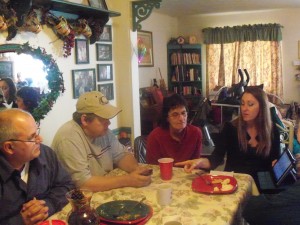9 Helps for Siblings With Elderly Parents
 What makes a family caregiver?
What makes a family caregiver?
Experience? Training? Need? Probably all of the above at one time or another. Siblings with elderly parents become caregivers often because they seem the logical solution to their needs.
Because you do love them, proceed with caution.
Simply because you are available; live closer; or may have the time and finances, you may not be the one to do the caregiving. And, if another solution is best, it does not diminish your love and concern for their well-being.
1 Take time to honestly evaluate the situation. Is this really a short-term need or could it evolve into a year-long commitment or more?
2 Is it really to their best interest to stay in their own home? If it seems to be a long-term commitment, would an assisted living facility better provide their needs? Have you talked with them about all the options?
3 Consider carefully how this will affect your family. Is your spouse supportive of this arrangement? Do you have small children to consider? (Note, it isn’t just “small” children; sometimes our teens are the most needy of a strong parent to guide them.)
4 Talk with the other siblings involved. THIS IS OF MAJOR IMPORTANCE. Be sure each child understands what will be needed from them. Do not be afraid of voicing your expectations up front. You need to know who will be there for you; you need a team.
5 Decide in the beginning of the care who will be in charge. Regardless of which one is actually staying in the home, who will be the go-to person if there is confusion? Who will be the one responsible to make the final decision?
6 What will be needed to provide proper care? Can you keep up with the overall needs? Would another sibling be better suited to provide extra funds as needed while you do the caregiving? Does maintenance need done on the home? Who will do that? Who will pay?
7 Outline the daily and weekly needs of the home. Who will be doing the shopping? Who will be in charge of the kitchen? Make sure everyone involved is aware of any special dietary needs or allergies.
8 Is there is a yard to keep or outside responsibilities? Which child is best suited for that? Who will be the outside go-to person to avoid conflict later? Consider what has been important to the parents in the past. If you cannot keep the yard as they have done, try moving favored plants to planters so they can be seen from the windows.
9 Are you aware of their end-of-life decisions? Do they have living wills, health care directives, powers of attorney, or other matters that need updated? Does the family have an attorney? These things are often difficult to discuss as the older generation kept things to themselves. I can still hear my mother saying, “That is none of your business!” It was a challenge to get beyond that hurdle so she could receive the best of care.
God tells us to honor our father and our mother.
That may mean caring for them when we might rather be doing other things with our lives. It may mean entrusting their care to others. I challenge you to spend time in prayer before making decisions. Then, review the questions as best you can, and get a good support team for the journey.
Blessings to each of you; let me hear from you.
Hugs,
![]()
For an article on items mentioned in tip #9 above (living wills, etc.) click here.

A special heart-felt “thank you” to all those who have cared enough to share this post. Often we can be such a help and encouragement to others by simply sharing good information with them. Prayers and blessings to each of my precious readers! And … HUGS!
Hit the nail on the head with this one!!
Thanks, Cheryl! We all need a little help from time to time, and a Whole Lot of Encouragement!